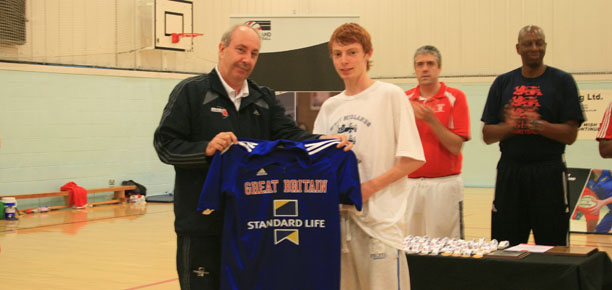Warwick Cann Talks British Basketball

The question of what is holding back basketball in Great Britain (GB) is something I get asked on a weekly basis. Though I try to give an honest answer, I always feel it would be much more interesting to ask someone who actually has a direct responsibility for the sport. Last week over the course of 45 minutes, GB’s Head of Performance Warwick Cann (pictured holding the jersey), answered my questions and discussed the state of the game.
With a background of over 20 years in elite sport management and coaching, Cann took his position 2 years ago in September 2009 and was appointed to tackle the elite end of the spectrum for basketball in the UK. His responsibilities range from developing the often discussed standards of coaching, overseeing the GB Regional Institutes of Basketball, helping with the Advanced Apprenticeship in Sporting Excellence (AASE) programmes, and co-ordinating the national team programmes for the GB Futures and Under-20s, as well as Under-18, Under-16 and Under-15 sides in England (and an Under-17 development programme he revealed they will be initiating). “It’s all geared towards establishing a pathway for elite level basketball players and coaches to progress in a better fashion, with more quality and the intention of providing a future for British basketball and the home nations,” Warwick explained.
Cann, an Australian, is surprisingly positive about the work England Basketball (EB) had done before he came into his role, pointing to the well documented financial issues that the current CEO, Keith Mair, has sorted out. “The stark reality is that 5 years ago England Basketball was broke, bankrupt or non-functioning so I think EB, Keith Mair and others have done a good job in building over the last 5 years”. However, he admits there was little framework for player development, that coach education was severely lacking and a dearth of accessible facilities holds a stranglehold on the development of the sport.
“Whenever you come into a job you do a SWOT (Strengths, Weaknesses, Opportunities and Threats) analysis, so you look at what has been happening, what hasn’t been happening and what needs to happen,” Cann continued. “I made an assessment based on what has been done and considered the factors. Financial ability, existing national framework models as well as facilities, were the three things I needed to get my head around to be able to map out a strategy for a performance pathway going forward”.
England Basketball are stuck between a rock and a hard place when it comes to growing basketball because their funding relies on participation. Can you solely focus on the elite end of the spectrum with the hope that having high performing national teams will increase participation, or do you focus on the grass-roots with the idea that the more people are playing the more likely you will be to eventually produce a good national team? It is clear that in our junior leagues there are some programmes that are head and shoulders above the rest and that produces a huge disparity in competition; putting EB in a difficult situation and limiting player development.
Cann states that EB are trying hard to establish Central Venue Leagues to better cater for participation and fix that disparity, but says that high participation numbers are crucial to produce elite level basketball players. “Performance relies upon participation, it relies on volunteers to do the things right at a junior level, it relies upon an element of quality in all we do at club level to get better coaches and players. No-one ever stays in one place, as you grow you follow a performance pathway, but you start as a junior player; Under-8, Under-10 in a club. What you learn in those formative years has a lot to do with quality that you’ll experience as you go along the performance pathway. We need participation and we need clubs to be healthy. I know that EB are looking at it very very closely.”
The aforementioned funding model used by Sport England (who decide the amount of money each national governing body will receive), which only measures participation in people 16 years of age and older, also doesn’t help says Cann. “That focus doesn’t necessarily help basketball which I think to be internationally competitive needs to look at a wider participation model at younger age groups. I think it should be more players in either Central Venue Leagues or localities at Under-12 or Under-14 levels, that’s where participation needs to grow from, from my perspective at least based on what I know from other countries”.
“I think sometimes what is mapped out by Sport England for the federation, doesn’t allow EB to concentrate on the areas that they would normally like to. I’m not saying that as an excuse, I’m just saying there’s a bit of a discourse between where participation is best measured in this country and that creates certain logistical problems.”
Funding however, is only one piece of the puzzle. In Warwick’s mind, training environment (access to facilities, coaching), a professional league that develops players, and a domestic development pathway are the keys to developing a world class programme, but he admits we still “have a long way to go”. Launching into a five minute analysis of the things basketball in the UK lacks, it became quite apparent that he is acutely aware of the issues; a far cry from the perception that those ‘in charge’ of the game have very little clue as to what is going on.
“We need a good training environment for our players, that’s both facilities access as well as coaching supervision of our younger players. The reality is, from the age of about 12 to 17 is a crucial area involving 5 years of investment and specialising time where people need to train more and work on their skills.”

Would DVO be where he is now had he not gone abroad?
Many people have pointed to the lack of progress in player development that seems to occur in that age range. The raw athletes and talent Britain possesses in young age groups, by some accounts, indicate we would be a world class programme, but somewhere along the line if the player chooses to stay in the UK, development and improvement seems to stall. Warwick wants to see more of a focus on skill development in clubs as opposed to winning and greater synergy between club and national programme coaching.
“We need coaches who can actually develop players over a 4-5 year period rather than just identifying talent and allowing it play. We need coaches who can actually teach the skills, analyse the skills, develop the skills and enhance the performance of whatever talent is around.”
“We need an organisational structure that allows it, we need more full time employed coaches who are focused on developing players rather than coaching teams and we obviously need a good professional league for which our players can aspire.”
“We need an alternative to the United States in development terms at High schools level which we are working on. We need a professional league that players can aspire to, or if they go overseas can come back to and launch themselves in to Europe and professional basketball if that’s what their ability is.”
Which brings us on to the top tier of basketball in the UK, the British Basketball League (BBL). The professional league has a role to play in developing the sport, but very few BBL franchises appear to care about developing young British talent.
Cann recognises that the economic climate is challenging. He reiterates competition at the senior level is extremely important, pointing to the fact that almost all high performing nations have strong domestic leagues and perhaps more importantly, are happy to invest in the development of young home grown players. “I would like the BBL and other EBL clubs to have full time coaches who could continue the development of an 18 year old and turn them into a professional player between the ages of 18-22, I’d welcome that, but I do acknowledge that we have to explore potential solutions for achieving this together”.
So much of our conversation comes back to coaching. The problems lie with a current coaching qualification system that allows an individual to be a ‘qualified’ level 2 coach after attending a course of just a few weekends, and a lack of a high quality coaching tradition meaning that few truly great coaches exist or are employed or engaged in a position to pass their expertise down. Add in that there is next to no chance of coaching being a full time profession anytime soon, it is obvious that the way it is being done at the moment isn’t working.
“It’s clear in the Areas of Emphasis, I’ve said in one of my recommendations that the coach education system needs to be looked at and that has been passed on to all the home countries. And in actual fact the Performance Management Group has now formed a working group to look at coach education and in particular the qualifications with a view to improving it,” he explained. It was evident he is not a fan of the current system, but was careful to not be overly critical of the organisation he works for. He revealed that an agreement in principle has recently been made to overhaul the Level 3 qualification, as well as bring in a new Level 4 geared towards those who are deriving an income from coaching. The Level 1 and 2 are expected to be looked at afterwards, but “these things take time”.
Included in the Areas of Emphasis was a national coaching curriculum to guide coaches on what needs to be focused on to develop basketball players; the first step in trying to improve coaching standards. It is currently the most high-profile thing Cann is involved with, and despite the sentiment being celebrated, questions remain as to how its implementation will be effectively monitored.
The old adage ‘you can lead a horse to water but can’t make it drink’ comes to mind. However, he disagrees. “I’ve just come back from Lilleshall Under 13 girls where I’ve written a report which provides feedback to all the coaches. There is noticeable improvement within passing, shooting and finishing which are three areas which were maligned a few years ago and are highly referenced in the Areas Of Emphasis,” this perhaps may be true, but does little to indicate a cause and effect relationship. “We need to get better at some of the ways we do measure,” Warwick relented. “But monitoring is certainly part of it. The reality is you can’t watch every coach in the country do their job and of course it’s voluntary so you can’t make every coach do it. I think there is significant pride amongst British coaches in wanting to do better and if we can take some of the focus away from winning and concentrating on doing a better job at training we will in fact be able to make an impact.”
Would 5 or 6 purpose built basketball facilities across the country go a long way in solving a lot of the problems basketball has suffered in the UK? “Yes.” he answers in a matter-of-fact manner. I push for some elaboration as to why if that is the answer, then it appears as though nothing is being done to make it happen. “Certainly in England I know they have plans and they have looked at regional development centres, but the reality is that the funding level from Sport England for facilities is minor and so they don’t have a lot of investment”. What that means, he explains, is that NGB’s have to to find other partners like local councils who are prepared to invest, but with most of them being in a ‘sport for all’ mindset, they want to see their money spent on a multi-purpose centre that would benefit as many people as possible.
“Certainly purpose built facilities and four court stadiums (would make a difference), if they were accessible, and I think this is the point, it’s the access and the cost of access for basketball which is becoming the limiting factor. It’s not just for games but it’s for training as well, whereby other community models like football have their own assets, have their own fields which they’ve accumulated over a period of time, basketball is playing catch up in that area, it’s a tough area.” He openly questioned whether it was “a wish too far” to hope that we would see community based basketball facilities on the near horizon, as they have in places like France, Australia and Spain.

Cann thinks the Olympics will be "huge"
With 2012 fast approaching, there is no doubt that if basketball is ever going to explode in the UK, the London Olympics is the perfect opportunity. There will never have been a basketball event in Great Britain that has got as much media coverage or publicity, and it is likely there will never be anything like it again. Cann is optimistic about what it could do for the sport in the UK, hoping it will bring basketball into the living rooms of the British people and awaken them to what a giant of a game it is.
The one thing on many people’s mind though, is what the British basketball landscape will look like post-2012. British Basketball are only funded until 2013, and with FIBA demanding the home nations choose how they will be represented in international competition by June next year, there is a chance British Basketball will cease to exist as an individual body. “I think I can say that UK sport has been very pleased with the progress of basketball. I think we’re perceived as doing things the right way, developing a pathway, we’re certainly perceived as a sport that is very focused on after 2012,” Cann reveals, once again to my surprise. “I think that recognition is shared by UK Sport but it’s up to them to identify that so I would be hopeful that their support for basketball is ongoing based upon the performances and the things that we’re doing. I think most people recognise we’ve come a long way and it would be a shame just to drop the ball and not fund beyond that.”
I ask Warwick where he sees British basketball in 6 years, and he responds with a positive outlook by any measure of the imagination:
“We’ll be very competitive at the senior level, we’ll still have to work hard, but our international teams will be successful. Hopefully all our junior teams will be qualified in Division A, as hard a task as that is. We’ll have overhauled coach education, and the schools system/pathway as an alternative to United States high school will be clearly evident for our players and we’ll at least have a plan for those coaches who are good enough to coach professionally so they can aspire to have a career in their own country.”
There is no doubt Warwick has huge aspirations and an even huger task ahead of him, a task that anyone involved with basketball in the UK knows is likely to be incredibly frustrating. I ask him what the worst parts of his job are; “I don’t have worst parts, everything that’s worst is a challenge and I wouldn’t be here if I didn’t want a challenge”.
What do you think of Warwick’s thoughts and what GB/EB are doing? What would you do differently? If you have any questions drop a comment and let me know as I may be able to answer them from the transcripts!



Pingback: ‘New Horizons’ – England Under-17 Development Programme Revealed — Hoopsfix.com